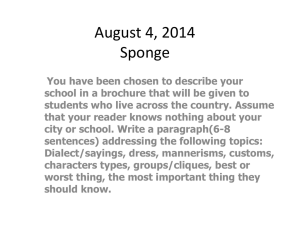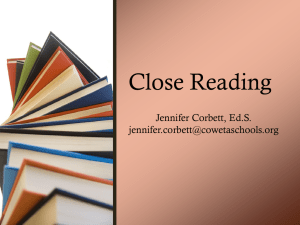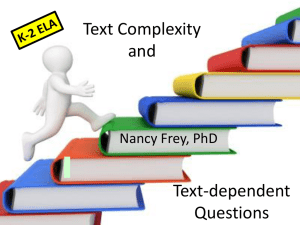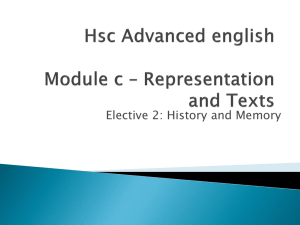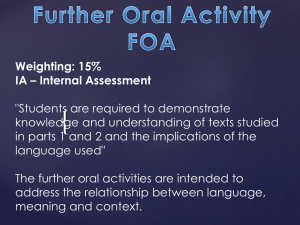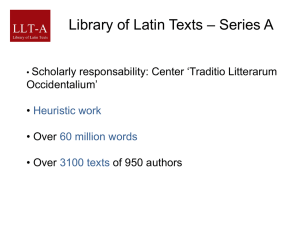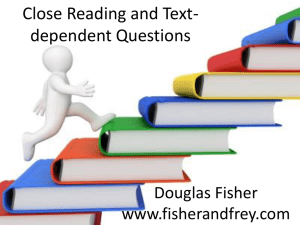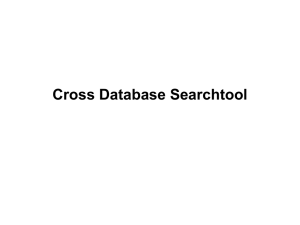The Annotation Conversation
advertisement
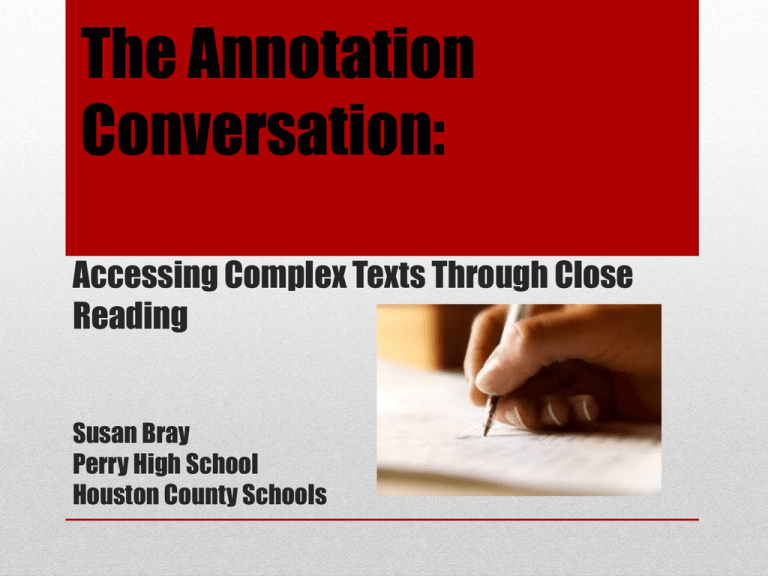
The Annotation Conversation: Accessing Complex Texts Through Close Reading Susan Bray Perry High School Houston County Schools • • • • • • 20 Years experience as a classroom teacher Two time STAR Teacher B.A. English with Secondary English Certification M.Ed. In English Education Gifted Certification Six years experience in Advanced Placement Literature Professional Qualifications 1. Audience members will be able to understand the need for the use of highinterest Young Adult Literature as a bridge to accessing more complex informational and literary texts. 2. Audience members will understand the importance of frequent library visits to help students have access to high-interest texts. 3. Audience members will understand the necessity for student interaction with text as a necessity for comprehension of more complex textual material. 4. Audience members audience members will be able to use a variety of methods to teach annotation as a reading comprehension tool. 5. Audience members will understand research-driven best practices that support student interaction with text as a means to higher levels of comprehension Presentation objectives 6. Audience members understand the validity of connections between YA texts and literary texts. 7. Audience members the necessity of vocabulary instruction as a part of textual analysis. 8. Audience members the relevance of textual annotation in all grade levels from elementary to post-secondary. 9.Audience members will be able to utilize a host of technological resources to utilize for accessing complex texts. 10.Audience members will be able to understand that as rigor levels increase and text complexity is more closely scrutinized, teachers much have a wide variety of techniques to help students access Presentation objectives • As we all know, Common Core Standards mandate that students comprehend multiple texts of increased complexity with a greater depth of knowledge while using these texts to construct written responses on assessments unlike anything we have seen on a standardized test before except for the Advanced Placement classroom. Common Core Standards • While the Lexile framework can certainly be one measure of a reader's growth, it certainly is not the only tool that should be used in determining whether a student's reading choice is appropriate. Lexile Scores • • • • Divergent by Veronica Roth - 700L - Grade 9 The Maze Runner by James Dashner - 770L - Grade 9 Ender's Game by Orson Scott Card - 780L - Grade 9 "I Have A Dream"- Speech by Martn Luther King Jr. 1000 L • Grade 11-12 Common Core Reccomendations 10701220L Lexile Scores "Education is not the filling of a pail, but the lighting of a fire." William Butler Yeats • One challenge that students will never evade is the necessity to wade through large pieces of information and understand complex reading material. With our students set firmly in the midst of the greatest information overload that our world has ever known, there has never been a greater need for them to possess savvy reading skills that allow them to discriminate thoughtfully, analyze arguments, identify propaganda techniques, and assess the rhetorical strategies utilized to create those arguments. Increased rigor requirements in Common Core and national standards utilized by organizations like The College Board in assessments such as the AP exams and the SAT demand that the student reader be able to quickly and thoroughly access and comprehend said texts and incorporate evidence from those texts into writing. In order for students to reach the required level of depth for analysis of complex texts, frequent and detailed annotation is essential. The Challenge • This presentation will mesh with the theme of "Teachers: Classroom Change Agents" because despite the current controversy about Common Core standards, the truth is that our students will be faced with competition for jobs against not only workers throughout the nation, but on a global basis. Our students will compete with workers from Massachusetts, California, Beijing, and Helsinki. We cannot afford to do them the disservice of not challenging them with complex tasks. As educators, we must take the responsibility of changing the current paradigm that allows students to disengage from textual material. Thorough and frequent annotation of texts provides evidence of student comprehension of texts, connections to prior knowledge, vocabulary enhancement, textual evidence for students to utilize on written assignments, and proof of engagement and higher level thinking skills. College and Career Readiness • For students to become proficient at close reading, frequent rereading of complex passages and annotating regularly is key. Practice • Encourage students to have a conversation with the text and engage with it as if it were a person. This dialogue which one captures in the annotation process is a valuable process not only due to the metacognition it encourages, but also due to the ability for students to capture initial reactions, questions, associations, and difficulties. Conversation • Annotation gives educators evidence of student growth through a record of their thought processes. Students also gain independence in this skill, as in any other, with prolonged and regular practice. Just as dissecting a frog in biology gives students a greater understanding of the inner workings of the muscles and circulatory system, the thorough dissection of a piece of writing produces the same level of deeper insight. Why Annotation ? • Encourage your kids to acknowledge what they don't know. So often students shy away from words or phrases that they initially don't understand. However, they need to be trained to identify those troublesome spots and be intentional about determining why the author has chosen the language or image. "I know that I know nothing.“-Socrates Metacognition • On that note, student must also have it proven to them that rereading is invaluable and that by not reading a piece more than once, they may be missing out on subtleties that will lead to a greater depth of knowledge. However, readreading must be purposeful and have specific direction. Rereading • In order for student to adequately analyze literary works, they must be trained to consider the nuances of language and to always consider an author's purpose and intention for chosen diction. Language that seems particularly odd or unusual should carefully considered for its connections and connotations. Students should be trained in phrases such as “The word ________ is associated with ___________ and brings forth thoughts of _________ and __________.” or “ The author's use of the words _______________ and ___________ further his goal of portraying __________ as _____________.” Given these frameworks, students will come to recognize the power of associative language and the connections between images and emotions. Word Choice • Make connections • Ask questions • Summarize (particularly for lower level students or challenging pieces) • Talk Back An Annotation Guide • Students in high school are confronted with standardized testing that expects them to have high reading levels, yet rarely are these students taken to the library to find high interest reading material that they are held accountable for in class. Encouraging the reading of high interest young adult material allows students the chance to pursue their own interests while independently strengthening vocabulary, cognitive ability, creativity, and reading stamina. Reading for Pleasure Student Samples Student Samples Student Samples Student Samples Sudent samples "Close Reading and the CCSS, Part 1." - Common Core State Standards TOOLBOX. N.p., n.d. Web. 29 May 2014. "College Board." AP Central. N.p., n.d. Web. 29 May 2014. "Deacon Betts and the First Church of Creative Writing." The VoicesBlog RSS. N.p., n.d. Web. 29 May 2014. ICS "Funny Teacher - Bing Images." Funny Teacher - Bing Images. Web. 29 May 2014. N.p., n.d. "Membership." Educational Leadership:Common Core: Now What?:Closing in on Close Reading. N.p., n.d. Web. 29 May 2014. Resources
